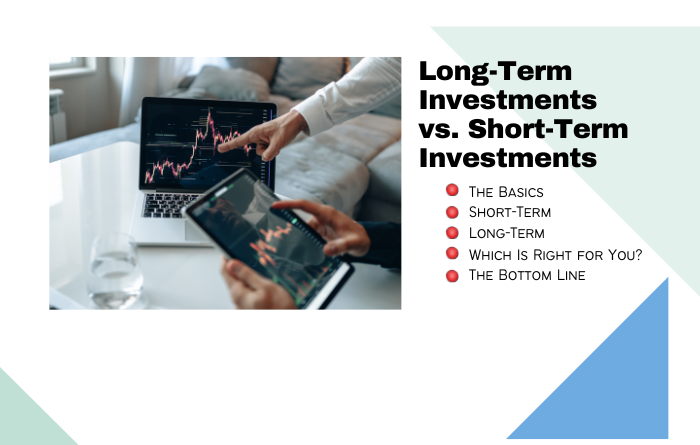Long-Term Investments vs. Short-Term Investments
Setting up an investment portfolio requires clarity about what your goals are, what your risk tolerance is, and what kind of investments you want.
You also need to know what your time horizon is.
Are you looking to make money quickly or are you in it for the long haul? This will impact whether your portfolio is focused on short-term investments, long-term investments, or some mix of the two. Knowing the difference between short- and long-term investments and the pros and cons of each will help you make sure your investment portfolio is suited for exactly what you want to achieve.
The Basics
Generally speaking, short-term investments are ones held for less than a year, while long-term investments are held for more than a year.
Both short- and long-term investments could be in any asset class, but some assets are more likely to make sense as one or the other.
Stocks, for instance, could fit in either asset class. If an investor believes a stock is going to get a brief bump in value, they could buy shares and sell them when they believe the stock has reached its peak.
If an investor sold it once the value had gone up, they would have made money by holding the stock for a very short time.
On the other hand, if an investor finds a stock they believe will grow slowly over a long period and holds it for at least a year, selling, for instance, closer to retirement age, that is a long-term investment.
Pros and Cons: (Short-Term)
Short-term investments can be useful in a portfolio, but they do carry a heavy risk.
The major benefit of a short-term strategy is that if it is handled correctly, it can bring in quick returns. This money can be reinvested and continue to grow, boosting the total value of your portfolio.
That said, a short-term investment carries substantial risk. If the stock you think is going to skyrocket craters instead – or if you mistime the market and miss the ideal time to sell – you’ll be left carrying the water.
Another con of short-term investments is that even if you do make money, the taxes are higher.
Short-term capital gains are taxed as regular income, while long-term capital gains have their own separate tax rate.
If you make a lot of money off of short-term investments, you may be bumping yourself into a new tax bracket, potentially eating into your earnings.
Pros and Cons: (Long-Term)
The biggest pro of long-term investing is that there is a lot less risk than with short-term investments.
If you’re planning on holding an investment for 20 years, it doesn’t really matter if there is a recession in year seven – as long as the overarching economic system holds up, history shows that you will be up in the long run.
The other major pro is that you’ll pay less in taxes when you do cash out.
Long-term capital gains are taxed at between 0% and 20%, so the government will take less of the money you earn than if you’d made money more quickly.
The con of long-term investing is that with lower risk generally comes lower reward.
Your earnings could be degraded by inflation over the period you held it, and the chances for a huge gain are much smaller than in a market-timed investment.
Which Is Right for You?
For most people, long-term investments are the most sensible choice. Short-term investments require a lot of attention, and most people aren’t willing to do that.
A financial advisor may recommend some short-term investments, but unless you are willing to put a significant chunk of your money at risk, it might not be worth it.
If you do use short-term investments, make sure you do all of the research necessary and, ideally, work with a financial advisor who can guide you.
Also, make sure that you also have long-term investments in your account to form the base of your portfolio.
Short-term plans can be used to look for a boost, but for most individual investors long-term investments are the heart of a solid strategy.
The Bottom Line:
Short-term investments are held for less than a year, while long-term investments are held for a year or longer.
Generally speaking, long-term investments are the best option for most individual investors, while short-term investments can be used if you are savvy enough to exploit openings.
